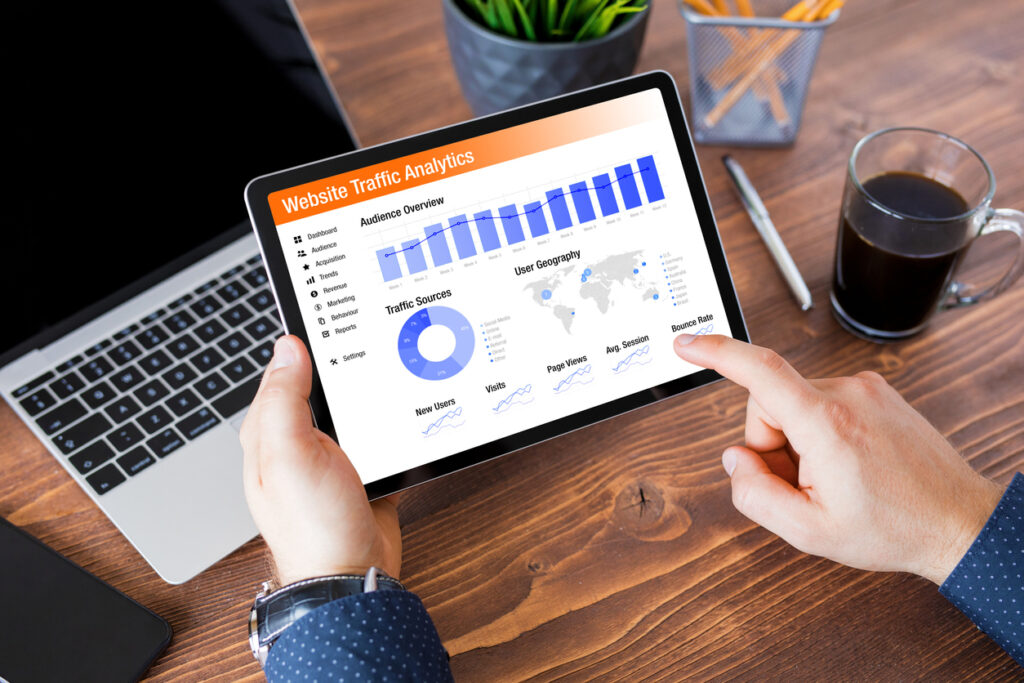Advanced Analytics: The Power of GA4 and UA
GA4 vs. UA Benefits: The Power of Advanced Analytics

If you’ve been diving into the world of advanced analytics, chances are you’ve come across two powerful tools: GA4 and UA. These acronyms might seem confusing at first, but fear not! In this article, we’re going to demystify the differences between GA4 and UA and explore the remarkable benefits they bring to the table. So grab a cup of coffee, sit back, and let’s delve into the world of advanced analytics.
GA4: The Next Evolution of Google Analytics
GA4, short for Google Analytics 4, represents the latest iteration of Google’s powerful analytics platform. It’s designed to provide businesses with a deeper understanding of user behavior across multiple devices and platforms. With GA4, you can gather data from websites, mobile apps, and even offline sources, allowing you to paint a comprehensive picture of your audience.
One of the standout features of GA4 is its enhanced event-tracking capabilities. Unlike its predecessor, Universal Analytics (UA), GA4 allows you to track events without the need for additional code modifications. This streamlined approach saves you time and effort, freeing you up to focus on what matters most: analyzing your data.
UA: A Tried and True Analytics Solution
Universal Analytics (UA), on the other hand, has long been a staple in the analytics world. It’s the predecessor to GA4 and has powered countless businesses with valuable insights. UA offers a wide range of features and customization options, making it a versatile tool for businesses of all sizes.
One of the key benefits of UA is its compatibility with a vast array of platforms and integrations. Whether you’re tracking website data, e-commerce transactions, or mobile app usage, UA has you covered. It also provides in-depth reporting and segmentation capabilities, allowing you to tailor your analysis to specific user segments.
The Benefits of GA4: Unlocking Enhanced Insights

Now that we’ve introduced both GA4 and UA let’s explore the unique benefits that GA4 brings to the table. By leveraging GA4, you can uncover a wealth of advanced insights that can propel your business forward.
Enhanced Cross-Platform Tracking
In today’s digital landscape, users interact with brands across various devices and platforms. GA4 recognizes this shift and offers robust cross-platform tracking capabilities. With GA4, you can gain a holistic view of your user’s journey, regardless of whether they’re browsing your website, using your mobile app, or engaging through other channels. This comprehensive understanding enables you to optimize user experiences and identify opportunities for growth.
Machine Learning at Your Fingertips
GA4 takes advantage of Google’s expertise in machine learning to provide you with actionable insights. By applying advanced algorithms to your data, GA4 can uncover patterns, predict user behavior, and offer valuable recommendations. This powerful integration of machine learning empowers you to make data-driven decisions that have a real impact on your business.
Simplified Event Tracking
Say goodbye to complex code modifications! GA4 introduces a simplified event-tracking system that allows you to track a wide range of user interactions effortlessly. Whether it’s button clicks, video views, or form submissions, GA4’s event tracking capabilities provide a streamlined approach to capturing valuable data. This means less time spent on implementation and more time spent on analysis and optimization.
Future-Proofing Your Analytics
With the rapid evolution of technology, it’s essential to future-proof your analytics infrastructure. GA4 is designed with this in mind, offering a flexible and scalable platform that adapts to changing trends and user behaviors. By migrating to GA4, you ensure that your analytics setup remains relevant and effective in the years to come.
Seamless Integration with Google Ads
For businesses running Google Ads campaigns, GA4 offers seamless integration that unlocks powerful insights. By connecting your GA4 property to Google Ads, you can gain a deeper understanding of how your advertising efforts impact user behavior. This integration enables you to optimize your campaigns, allocate budgets more effectively, and drive higher returns on your advertising investment.
Wrapping Up

Congratulations on reaching the end of this detailed exploration of GA4 and UA! We’ve uncovered the power of GA4’s enhanced event tracking, the versatility of UA, and the unique benefits that GA4 brings to the table. Whether you’re looking to gain cross-platform insights, leverage machine learning, simplify event tracking, future-proof your analytics, or integrate with Google Ads, both GA4 and UA offer valuable solutions.
Remember, the key is to understand your business goals and choose the analytics tool that aligns best with your needs. So take the time to evaluate your requirements, explore the features and capabilities of both GA4 and UA and make an informed decision that sets you on the path to analytics success.
Happy tracking!
How Red Crow Marketing Can Help
At Red Crow Marketing, we have been working with Advanced Analytics for years, supporting both our own website and the websites of our clients. We have found the greatest success by staying up to date with any new capabilities and tools that Google offers through its Analytics platform. In addition to basic traffic and entry point metrics, we have the capability to track numerous marketing metrics and conversions to optimize websites and Ad campaigns, leading to substantially improved ROAS.
By utilizing Advanced Google Analytics, our clients can also track the KPIs of their online campaigns and optimize their website content for better visibility and search rankings, leading to higher traffic and conversion rates for their websites. Moving into the future, we will be using Google’s machine learning to help further identify trends in your online media data and use it to forecast upcoming media campaigns.
Utilizing Advanced Analytics is one of the best efforts you can make to improve your brand’s online presence. Contact us today and get started with advanced analytics!
FAQs about advanced analytics
Advanced analytics refers to the use of advanced techniques and tools to analyze data and extract valuable insights. It goes beyond basic descriptive analytics and incorporates predictive and prescriptive analytics methods to make data-driven decisions and uncover hidden patterns, trends, and relationships within the data.
Using advanced analytics offers several benefits, including:
- Improved decision-making: Advanced analytics provides deeper insights into data, enabling more informed and strategic decision-making.
- Enhanced efficiency: By automating data analysis processes, advanced analytics saves time and resources, allowing businesses to operate more efficiently.
- Competitive advantage: Organizations that effectively leverage advanced analytics gain a competitive edge by identifying opportunities, optimizing operations, and understanding customer behavior.
- Improved customer experience: Advanced analytics helps businesses understand customer preferences, personalize experiences, and deliver targeted marketing campaigns.
- Risk mitigation: Advanced analytics can identify potential risks and fraud patterns, enabling proactive measures to mitigate them.
Common advanced analytics techniques include:
- Predictive modeling: Building mathematical models to forecast future outcomes based on historical data.
- Machine learning: Algorithms that learn from data to make predictions or take actions without explicit programming.
- Data mining: Exploring and analyzing large datasets to discover patterns, correlations, and insights.
- Text analytics: Extracting insights and sentiment analysis from unstructured text data, such as social media posts or customer reviews.
- Optimization: Using mathematical algorithms to find the best possible solution to a problem, such as optimizing resource allocation or scheduling.
Yes, advanced analytics can benefit businesses across various industries. Whether you’re in finance, healthcare, retail, or any other sector, the ability to gain deeper insights from data is valuable. Advanced analytics can help improve operational efficiency, identify cost-saving opportunities, enhance customer experiences, and drive revenue growth.
Implementing advanced analytics can present a few challenges, including:
- Data quality and availability: Advanced analytics relies on accurate and comprehensive data. Ensuring data quality and having access to relevant data can be a challenge.
- Skill requirements: Advanced analytics techniques require expertise in statistics, data science, and programming. Businesses may need to invest in training or hire skilled professionals.
- Integration and infrastructure: Integrating advanced analytics tools into existing systems and infrastructure can be complex, requiring careful planning and resources.
- Privacy and security: Advanced analytics often involves working with sensitive data. Organizations must ensure appropriate security measures and comply with privacy regulations.
Artificial intelligence plays a significant role in advanced analytics. AI techniques, such as machine learning and natural language processing, enable automation, pattern recognition, and predictive modeling. AI algorithms learn from data and adapt to new patterns, enhancing the accuracy and effectiveness of advanced analytics applications.
- Define your goals: Identify the specific business challenges you want to address or the insights you want to gain.
- Assess your data: Evaluate the quality and availability of your data. Determine if any data gaps need to be addressed.
- Choose the right tools: Research and select advanced analytics tools or platforms that align with your needs and budget.
- Acquire skills or seek assistance: Depending on your resources, you may need to train your team in advanced analytics techniques or consider partnering with external experts.
- Start small: Begin with a pilot project or proof of concept to test the effectiveness of advanced analytics for your business.
- Monitor and iterate: Continuously evaluate the outcomes of your advanced analytics initiatives, learn from the results, and refine your approach.
